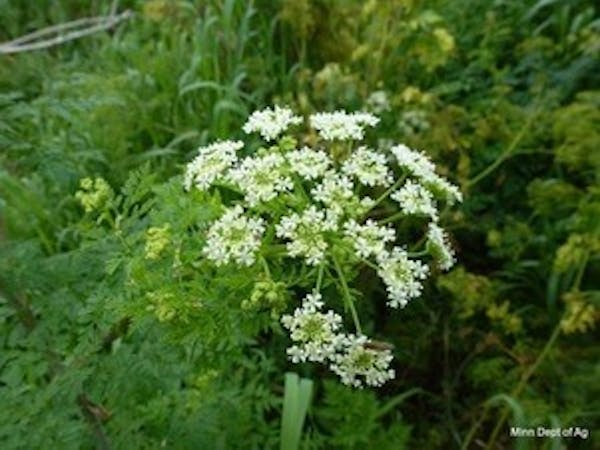Poison hemlock is spreading rapidly in Minnesota, the state Department of Agriculture warned Friday.
The toxic weed has been found in the Twin Cities, the Grand Rapids area and southwestern and southeastern Minnesota.
Officials warn against touching the weed's white cluster of flowers and suggest immediate emergency help if it's ingested. Poison hemlock, which is native to Europe, can grow 8 feet tall and has white clusters of flowers. It's now in bloom in parts of the state and sometimes is mistaken for wild carrot or toxic water hemlock. But poison hemlock can be differentiated from those two species because it has fern-like leaves and purple blotches on the stems.
All parts of the weed — leaves, stem, flowers and roots — are poisonous.
Last week, agriculture officials sent out a warning about the weed, noting it was popping up in isolated pockets of the state, including recent finds in southeastern Minnesota. Now it appears to be spreading quickly near St. Charles and Lanesboro, officials said.
Since then, residents have reported seeing poison hemlock in other parts of the state as well as in additional sightings in southeastern Minnesota, including Preston, Kasson, Rochester and Byron, said Ag Department spokesman Allen Sommerfeld. Officials are working on verifying the reports, he said.
Poison hemlock often is found along roadsides, in pastures, on the banks of streams and in ditches. If you suspect a sighting, take a picture and e-mail it to arrest.the.pest@state.mn.us.
Residents who have poison hemlock on their property should be careful when getting near it or trying to get rid of it. Wear gloves, long sleeves and pants, especially if pulling it from the ground. Follow herbicide directions. And if it's mowed, clean equipment, clothing and shoes.
People reportedly have been poisoned by handling the plant. Residents are advised to call Minnesota Poison Control at 1-800-222-1222 if the plant is ingested. If the person is unresponsive or having trouble breathing, call 911. If an animal eats it, immediately call a veterinarian.
More information can be found on the Minnesota Department of Agriculture website.
Mary Lynn Smith • 612-673-4788

Want to share info with the Star Tribune? How to do it securely

'Safe recovery sites' would offer syringes, naloxone and more to people using drugs. The plan could be in peril.
New Minnesota GOP leaders seek peace with party's anti-establishment wing

Who is Republican Lisa Demuth, Minnesota's first House speaker of color?

